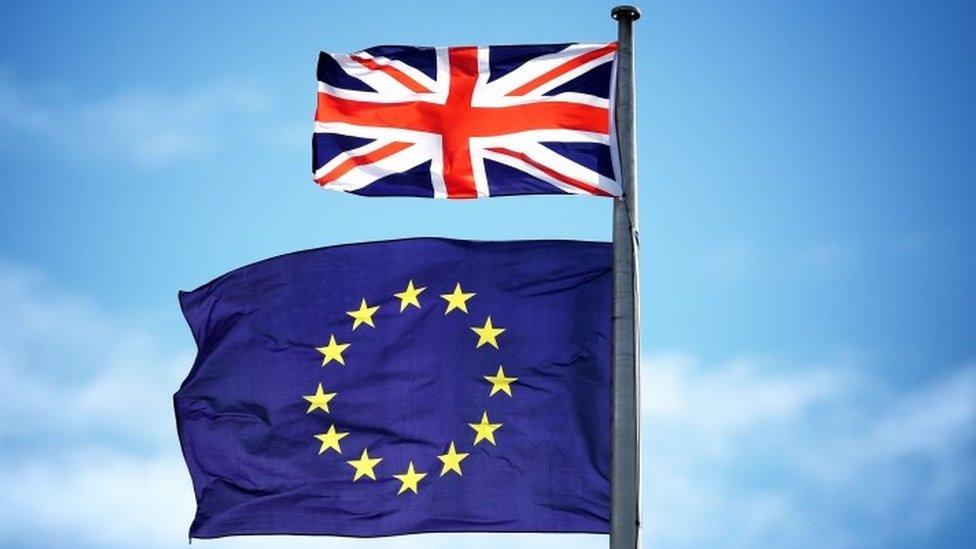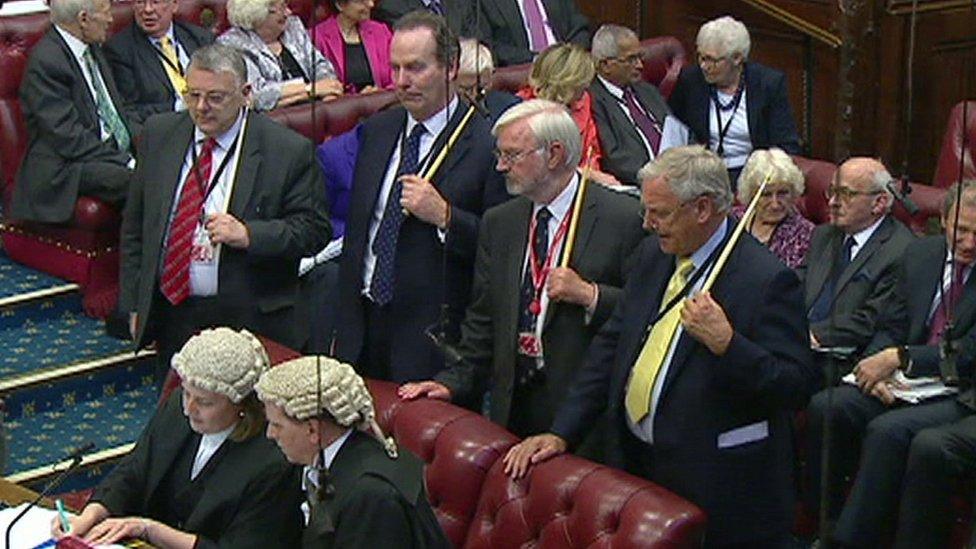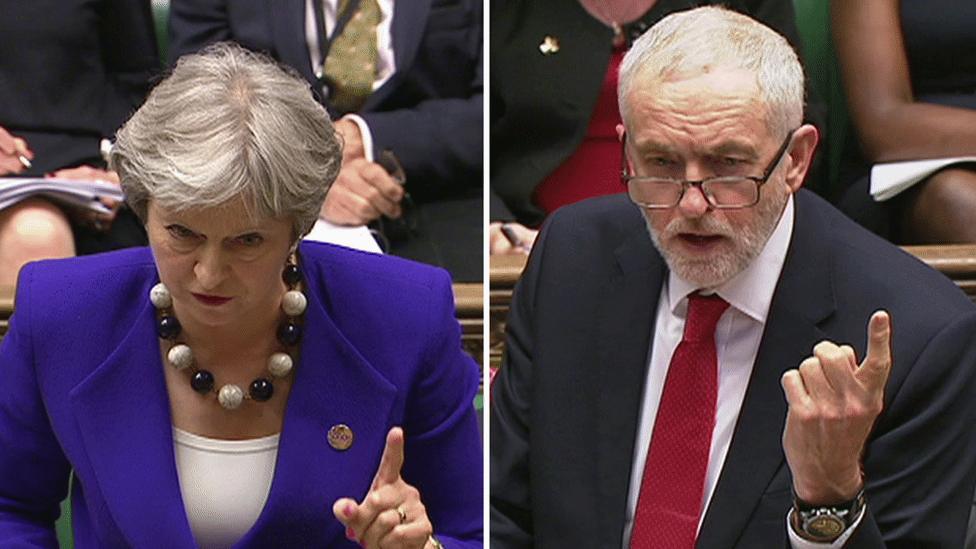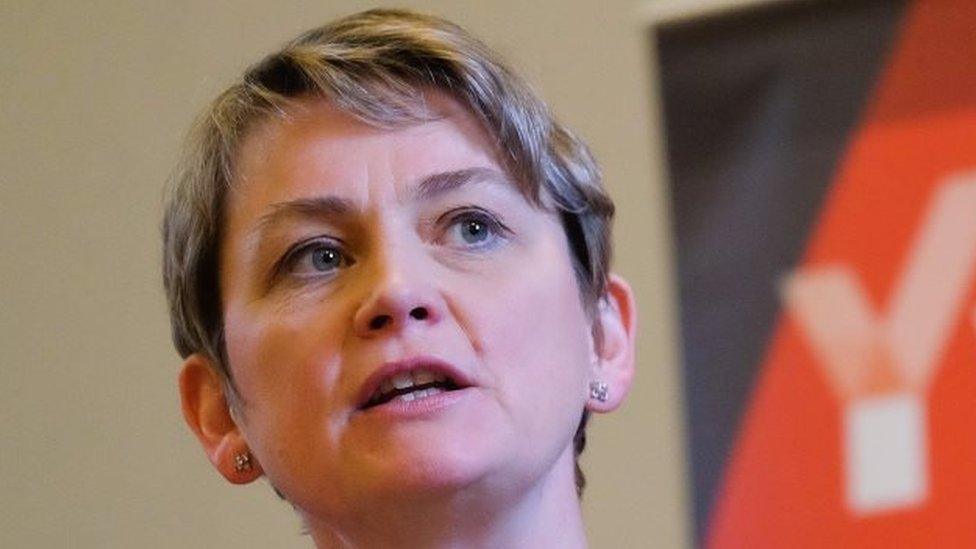Week ahead in Parliament
- Published
- comments

The difficult votes are piling up in the Commons.
The announcement that the Liaison Committee is to hold a debate on possible UK membership of the EU customs union will provide a kind of appetiser to forthcoming debates on Lords amendments to the EU (Withdrawal) Bill, external and rebel Tory MP amendments to the Trade Bill.
The vote on Thursday won't be treated by ministers as binding on the government, and Conservative MPs may not be whipped to attend, but it may provide an interesting test of Labour's attitude to CU membership - and the utterances from the Opposition front bench will be closely scrutinised.
Meanwhile in another flexing of select committee muscle, the announcement of a coordinating group of concerned committee chairs, to focus on the threat from Russia, demonstrates an increased appetite among the titans of the Committee Corridor to influence policy. (An interesting historical footnote is that the secretary to the group, Conservative Bob Seely, is a descendent of HH Asquith's Secretary of War, "Galloper Jack" Seely.)

Peers defeated the government on Wednesday
This week's Lords action on the EU (Withdrawal) Bill is around the clauses dealing with retention of existing EU law, including the guidance to courts and tribunals, and the main powers in connection with withdrawal - restricting the use and scope of delegated powers.
As this suggests, the issues in play are mostly more technical and less emotive than last week's votes (although the debate will probably reach a series of amendments including one from the Green peer, Lady Jones, to enshrine EU law on animal sentience in UK law, post Brexit) but the government is facing probable defeat.
There has been a lot of attention given to the list of Tory rebels, (the Duke of Wellington, former Chief Whip James Arbuthnot, etc...) but just as telling is the list of abstentions. Some normally loyal peers have been missing in action - and I know of one who has told his whips they cannot expect his support on any vote on this bill.
Monday
The Commons opens (2.30pm) with Defence questions - after which the usual crop of post weekend ministerial statements and urgent questions will doubtless be crowbarred into the agenda. This may well include a report back from the prime minister on the Commonwealth summit.
The day's main legislating is on the Rating (Property in Common Occupation) and Council Tax (Empty Dwellings) Bill, external, which tidies up the law on the rating of property in common occupation, and allows councils across England to charge double the rate of council tax on homes left empty for years.
Councils will be able to use funds from the premium to keep council tax levels down for others. Government guidance makes it clear that the premium should not be used to penalise owners of homes that were genuinely on the market for rent or sale. Labour support the idea of charging a premium on empty homes - but their recent housing manifesto argued for tripling rather than doubling the council tax on them, and they will probably try to amend it accordingly.
And Labour will attempt to block the Higher Education and Research Act 2017 (Consequential, Transitional, Transitory and Saving Provisions) Regulations 2018, establish the new Office for Students (OfS), the new regulator of higher education providers.
The OfS will replace both the Higher Education Funding Council for England (HEFCE) and the Office of the Director of Fair Access (DFA) to Higher Education. Labour's objections include insufficient student representation on the board. Their attempt to annul the order will be debated for 90 minutes.
The day ends with a adjournment debate led by the Lib Dem Jamie Stone on reimbursement for patient transport volunteer drivers - his Caithness and Sutherland seat is one of the largest mainland constituencies and the sheer distances pose a massive challenge in getting patients to and from NHS appointments. He will argue that Treasury policy on the reimbursement and taxation of volunteer drivers transporting patients does not take into account the mileage they run up in areas like his.
In Westminster Hall (4.30pm) the Petitions Committee has scheduled a debate on e-petition 205106, external: "We call for a ban on the outsourcing (privatisation) of NHS services, and stop the renewal of any outsourcing contracts already signed. Companies should not be profiteering from NHS contracts, when every pound of NHS budgets is desperately needed for more doctors and nurses, and to pay them more."
The petition attracted 237,227 signatures - and the government has responded by saying "the vast majority of NHS care has and will continue to be provided by public sector organisations. Patients should be able to access the best treatments based on quality of care not type of provider."
In the Lords (2.30pm) the main event is the next helping of report stage debate, external (day two of six) on the European Union (Withdrawal) Bill - the main event here will be another big cross-party amendment, seeking to enshrine the EU Charter of Fundamental Rights into UK law, minus its preamble and its fifth title (Citizen's Rights) which covers the rights of the EU citizens such as the right to vote in election to the European Parliament and to move freely within the EU.
It also includes several administrative rights such as a right to good administration, to access documents and to petition the European Parliament. This is another example of an amendment fronted by big figures from each main group - in this case the crossbench superlawyer Lord Pannick; Labour former Attorney-General Lord Goldsmith; Lib Dem front bencher Lady Ludford, and the Conservative former cabinet minister Lord Deben (the artist formerly known as John Gummer).
Their amendment aims to ensure that the Charter of Fundamental Rights continues to have effect, and that UK courts have the guidance they need in relation to the European Court of Justice, whilst ensuring that power remains in the hands of British judges.
Tuesday
Commons business opens (11.30am) with Justice questions. Then (assuming no statements or UQs) the Scottish Conservative Stephen Kerr presents a Ten Minute Rule Bill to make it more difficult for companies or individuals to make 'nuisance' unsolicited sales calls,
In 2016 there were an estimated 70 million calls and spam texts sent to UK residents. In 2014, nuisance calls cost UK citizens over £25m. He wants to change the definition of a nuisance calls to close loopholes that allow them to be made legally, to increase fines for wrongdoers, and impose heavier punishments for scammers.
That issue resurfaces in the main debate, which is on the report and third reading stages of the Financial Guidance and Claims Bill, external - where Work and Pensions Secretary Esther McVey, will propose new clauses on cold calling. If agreed these may precipitate a bout of parliamentary ping-pong with the Lords, because the Lib Dem Peer Lord Sharkey, who successfully amended the bill in the Lords, regards what she is proposing as a watering-down exercise.
Next comes the long awaited money resolution for the Mental Health Units (Use of Force) Bill, external, a private members bill from Labour's Steve Reed. This resolution is an essential procedural preliminary, which will allow committee stage scrutiny of the financial sections of his bill - which has been delayed for five long weeks. This all relates to wider shenanigans around another private members bill to scrap the proposed reduction in the size of the Commons.
In Westminster Hall, (9.30am) Conservative backbencher Adam Holloway will be relating his experiences from a week spent living rough in central London - he stresses the need to find ways to help homeless people who are vulnerable because of mental health issues and drug addition.
Other subjects debated include regulation of independent financial advisers (11am) and the cost of the Dieter Helm energy review (2.30pm) - and watch out for the debate led by Plaid Cymru's Liz Saville Roberts (4pm) on defamation of Welsh language speakers - it stems from a Sunday Times column by Rod Liddle that, she says, effectively mocked Welsh poverty and the use of the Welsh language. Complaints were made to the press standards body, IPSO, but nothing could be done about it because there are no legal protections for linguistic groups as there are for racial groups for example. So she will be discussing the need to protect Welsh speakers in future.
Finally Labour's Barry Sheerman leads a debate on global road deaths (4.30pm). He says there are now 3,500 deaths per day across the world and that safer countries like the UK and Sweden have a lot of experience to share, which could reduce the toll. Mr Sheerman introduced compulsory child restraints in UK and organised seat belt legislation.
My committee pick is the Digital, Culture, Media and Sport hearing (10.30am) where they continue their Fake News inquiry by questioning Dr Aleksandr Kogan of Cambridge University, a key figure in the saga around Cambridge Analytica and data from Facebook.
In the Lords (2.30pm) peers polish off the Haulage Permits and Trailer Registration Bill, external with a brief third reading debate. (This is a contingency bill to ensure there is a licensing system for freight post Brexit) Then they turn to the second reading of the Civil Liability Bill , external- this was supposed to be a relatively uncontroversial technical measure, among other things sorting out the law for compensation for whiplash injuries.
But it turns out that some peers don't like a one size fits all approach to compensation, and there is also a complicated issue about calculation of lump sum compensation payments intended to provide for people who have suffered long term injuries as a result of negligence.
Wednesday

The Commons opens (11.30am) with Scottish questions, followed by PMQs at noon. It's normally hard to say much about this in advance - but after last week's session ended with an apparent victory for the prime minister, which was then followed by questions about some of the facts she had deployed in debate, there might be a rather different and unpleasant flavour to this occasion.
Then comes a interesting Ten Minute Rule Bill from Labour's Luciana Berger. Her Health Impacts (Public Sector Duty) Bill would require public authorities to consider physical and mental health impacts in the exercise of their functions.
The idea is to bring a 'health in all policies' approach to the making and delivery of all central and local government policies, so that whenever a department or agency proposes a policy change, perhaps new transport networks, a change to the benefit system, or the curriculum in schools, the idea must be assessed on its impact on our mental and physical health. She says Britain needs to move beyond the idea that health issued should only be a concern for the Department of Health, or the NHS.
Two Labour Opposition Day Debates follow on schools and social care.
Next comes what will probably be a rather perfunctory debate on the report the government provides to the EU Commission on the UK's economic and budgetary position, as part of British participation in the EU's stability and growth pact. With Brexit looming this has a rather ritualistic flavour.
And finally, the adjournment debate is on the law on use of digital images and consent - the Labour MP Meg Hillier will raise the case of a constituent who was filmed while naked and asleep. She did not give consent but because the person who filmed did not publish no law has been broken. She believes this kind of privacy/harassment issue will not go away given the proliferation of mobile devices, and she will ask how ministers intend to address it.
In Westminster Hall debates include: protecting children in conflict areas (9.30am); capital needs of co-operatives (11am); transport for the South East (2.30pm); the future governance of Christchurch Council (4 pm - local MP Christopher Chope is opposing plans to force his local council into a merger with neighbouring Bournemouth) and strategy for internally displaced people (4.30 pm).
In the Lords (3pm) the main event is day three of the report stage of the European Union (Withdrawal) Bill - where the government faces a high powered amendment fronted by the former clerk of the Commons, Lord Lisvane, on restricting the scope and ensuring appropriate scrutiny of delegated powers.
If passed it would prevent ministers from making regulations where they deem it 'appropriate' rather than when it is 'necessary' - the argument here is that 'appropriate' can mean a good idea the minister came up with in the bath; 'necessary' can be tested in court. The government counter argument is that any number of possible course of actions could be considered 'necessary,' but ministers would have to choose the one which was most 'appropriate'. Expect the lawyers to enjoy several happy hours of hair-splitting.
Thursday
The Commons opens (9.30am) with Environment, Food and Rural Affairs questions, followed by mini-question times for the MPs who speak for the Church Commissioners, the House of Commons Commission, the Public Accounts Commission and the Speaker's Committee on the Electoral Commission.

Yvette Cooper is among the MPs tabling a debate on the customs union
Then at 10.30am comes the weekly Business Statement from the Leader of the House, Andrea Leadsom, where the dates for the next debates on Brexit legislation like the Trade Bill will be eagerly awaited.
The rest of the day is given over to debates on Backbench Business - starting with the Customs Union debate from the Liaison Committee (see above).
The motion, signed by a galaxy of committee chairs, notes that:
"the EU is the UK's largest export market for goods, accounting for a total of £145bn of exports and £241bn of imports in 2016; further notes the Government's expressed aim to secure the freest and most frictionless possible trade in goods between the UK and the EU after 29 March 2019; notes the importance of frictionless trade without tariffs, customs or border checks for manufacturers and businesses across the country who trade with the EU; further notes that the free circulation of goods on the island of Ireland is a consequence of the UK's and Republic of Ireland's membership of the EU Customs Union; in addition notes the Government's commitment to (i) in the UK-EU joint report on progress during phase 1 of the Article 50 negotiations, the maintenance of North-South cooperation and the all-island economy on the island of Ireland, (ii) the Belfast Agreement implemented in the Northern Ireland Act 1998 remaining a fundamental principle of public policy and (iii) the continuation of unfettered access for Northern Ireland's businesses to the whole of the UK internal market; and therefore calls on the Government to include as an objective in negotiations on the future relationship between the UK and the EU the establishment of an effective customs union between the two territories."
That will be followed by a debate on a motion on plastic bottles and coffee cups - led by the Environmental Audit Committee Chair, Mary Creagh.
She welcomes the proposed ban on plastic straws and stirrers - but with the government in the middle of a consultation on taxing single use plastics, all while we are waiting for a consultation on a deposit return scheme to start, and expecting a waste strategy in September, is this a sign of intra-Cabinet wrangling over who can be greener than thou? Some MPs are worried this is policy-making by announcement especially with the revelation that a deposit return scheme is not going to happen until 2020 at the earliest. So, as Parliament will have a chance to debate single use plastics - it should be interesting to hear what MPs think.
Finally, the former Northern Ireland Secretary, James Brokenshire, who had to resign from the government to get treatment for lung cancer, will relate the lessons from his own experiences in an adjournment debate on early diagnosis and treatment of lung cancer.
In Westminster Hall, there's a general debate on financial services and the UK economy led by the Conservative, Vicky Ford. She wants to discuss the issues facing a major sector of the UK economy - Brexit in particular.
In the Lords (11am) peers polish off their consideration of the Unpaid Work Experience (Prohibition) Bill, external and the Family Relationships (Impact Assessment and Targets) Bill, external before debating the report of select committee on the Long-term Sustainability of the NHS led by Lord Patel.
Friday
The Commons meets at 9.30am to consider private members' bills (it is unusual but not unprecedented for ministerial statements or urgent questions to be added to the agenda).
First up are the report and third reading stages for the Labour MP Chris Bryant's Assaults on Emergency Workers (Offences) Bill, external, which creates a new offence of common assault, against an emergency worker, with a penalty of up to 12 months in prison, double the current maximum penalty for assault.
In committee, an amendment was added to broaden the definition of an emergency worker, to include all clinical workers providing NHS services and support workers who have direct interaction with patients or the public, and also those who provide prisoner escort services.
A clause was also added to allow the taking of intimate or non-intimate samples from people who have spat at emergency service workers to test them for communicable disease - so their targets will not have to go through a long period of anxiety and precautionary medical treatments. Some of these issues may surface again in this debate.
The Labour MP Stephanie Peacock is due to have the second reading of her Employment and Workers Rights Bill, external - this has several aims; first to ensure equal treatment for agency workers by ending the equal-pay exemption in the 2010 Agency Worker Regulations, known as the Swedish Derogation; a loophole which been used in the UK to pay agency workers less than their permanent counterparts for the same roles. It also seeks to tackle the exploitation of agency workers used effectively as permanent staff by employers to who simply want to dodge the legal obligations they owe to normal employees.
In the Lords (10am) peers have more private members bills to discuss - starting with the detail of the Labour peer Lord Soley's Home Education (Duty of Local Authorities) Bill, external, which seeks to bring in closer monitoring of children educated at home.
Then comes the second reading of the Conservative, Lord Cormack's Bat Habitats Regulation Bill, external which aims to enhance the protection for bat habitats near building sites and to limit the protection for bat habitats in buildings used for public worship.